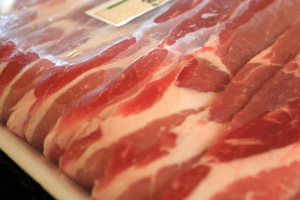The U.S. Supreme Court has blocked a California law that would require euthanizing downed livestock at federally inspected slaughterhouses to keep the meat out of the nation's food system.
The High Court on Monday agreed that the state's 2009 law should be blocked from going into effect.
That law barred the purchase, sale and butchering of animals that can't walk. It also required slaughterhouses to immediately kill non-ambulatory animals. Under the '09 law, "downer" pigs, sheep and goats also are prohibited from being bought, sold or slaughtered as food.
However, similar federal regulations only require that cattle unable to walk on its own be euthanized. Supreme Court justices said unanimously that the California law encroached on federal laws. The New York Times explains the conflict between the federal and state regulations.
California strengthened regulations against slaughtering so-called "downer" animals after the 2008 release of an undercover Humane Society video showing workers abusing cows at a Southern California slaughterhouse. (Advisory: The linked video contains graphic footage)
